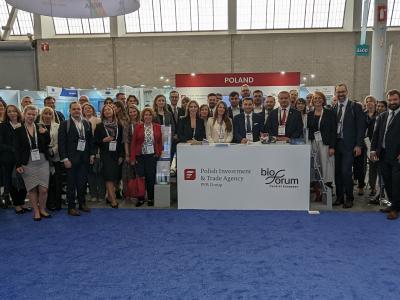Artificial Intelligence Supports Research on New Drugs. Polish Association of Innovative Medical Biotechnology Companies BioInMed Joins The Coalition for Health AI.
What a few years ago seemed like a concept from science fiction movies is now becoming reality. Artificial intelligence and machine learning are increasingly common and useful tools in developing new drugs and diagnostic methods. They increase the chance that new treatment options will be discovered and made available to patients. BioInMed joins The Coalition for Health AI, aiming to support the development of conditions conducive to the use of artificial intelligence in saving human health and life.
The use of artificial intelligence and machine learning in R&D of new drugs and diagnostic methods enables a significant reduction in the time spent searching for molecules and identifying the most promising candidates for clinical trials, reducing research costs, and increasing the chances of providing patients with new, effective technology.
From 5 Years to 12 Months...
The process of developing a new drug is very time-consuming and costly. The total cost of bringing a drug to the market is around 13.5 billion PLN and even several years of research and development work (on average approx.12 years), in which large, interdisciplinary teams of scientists are involved. Over the years, even 1,000 scientists have been working on the development of a new drug. Typically, the process to the stage of approval for clinical trials takes around 5 years. Thanks to the use of artificial intelligence, it has already been possible to shorten this process to 12 months in some projects.
Creating a new drug begins with an attempt to understand the mechanism of development of a given disease. Then researchers look for ways to inhibit this process. This requires many attempts, often ending in failure. Only one in 8,000 molecules gives a chance to create a new, effective and safe drug. From thousands of model molecules, only a few - those with the highest therapeutic potential - are subjected to further laboratory in vitro tests and then to toxicological tests in so-called preclinical studies. Few of the tested particles have a chance to move on to the next stage, which are clinical trials involving humans.
Where Can AI Support Scientists?
Artificial intelligence and machine learning increase the chances of project success and ensure effective treatment for patients. Machine learning algorithms can analyze available input data in an incomparably shorter time than a human, verify possibilities, and decide on the selection of resources and actions. People work in a completely different way, so research and development conducted exclusively by scientists takes much longer.
The Covid-19 pandemic has proven that in order to face current and future health challenges, we need swift and effective action in the field of research and development of new drugs, diagnostic tests, or vaccines. The use of artificial intelligence perfectly meets these needs.
"The use of artificial intelligence or machine learning is a trend that is very young. In Poland, there is still a lack of systemic approach and strategic support for the development of this technology. Therefore, it is necessary to create solutions that, on the one hand, would facilitate the development of these tools, and, on the other hand, would enable the acquisition of reliable data to feed AI algorithms. Gradually, more initiatives are beginning to emerge that will allow for an increase in the pace of development of these tools for the benefit of patients", explains Marta Winiarska, President of BioInMed.
The Coalition for Health AI is a rapidly growing, independent initiative that aims to support the development of artificial intelligence and the safe and transparent implementation of AI algorithms in healthcare. BioInMed hopes to be part of a platform that, with the patient in mind, takes part in shaping the policy of artificial intelligence development in Poland.



